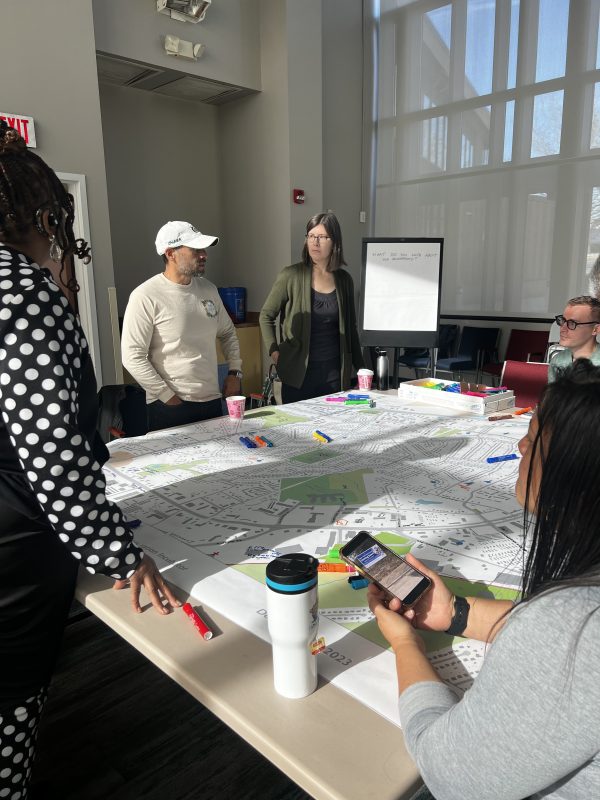The Faculty Behind the West Sugar Creek Community Innovation Incubator

by Mae Israel
Editor’s Note: Faculty member Nadia Anderson, associate professor of architecture and urban design at UNC Charlotte, serves as faculty coordinator on this project.
Shortly after joining UNC Charlotte nearly 10 years ago as a clinical assistant professor in the School of Social Work, Roger Suclupe noticed there wasn’t a course to help students learn about Mecklenburg County’s rapidly growing Hispanic and Latino communities.
With the help of a graduate student, Suclupe developed a course and began a partnership with a nearby health center in the Sugar Creek area. Later, he expanded student training to Hidden Valley Elementary School, where the majority of the children are Hispanic.
Before Suclupe started taking students to meet with fifth grade students and administrators, he was already visiting the elementary school to volunteer as a tutor or lunch buddy.
It was this connection to the school and the Hidden Valley community that attracted Suclupe to the Sugar Creek/ I-85 Community Innovation Incubator initiative. He is hopeful the committee of residents, service providers and university experts will come up with a viable plan for the community.
“We are working with two communities that have experienced multiple cycles of trust given and trust broken,” said Suclupe, who was born in New York to immigrant parents from Peru and moved with his family to Statesville when he was 11 years old.
“How do we help strengthen the confidence of the community to create a web of connectivity?” he asked. “We need to naturally expect challenges.”
One of the major issues facing residents in the Sugar Creek/I-85 area is a language barrier with immigrants who primarily speak Spanish and whose cultures are different. This creates misunderstanding and obstacles to a unified community.
Other UNC Charlotte faculty participating in the incubator were also previously involved in studying and evaluating community issues in the Sugar Creek area.
Kendra Jason, an associate professor of sociology, and two colleagues recently completed research on how housing insecure Black mothers navigated employment and managed their children’s education during the height of the COVID-19 pandemic.
“We wanted to ensure that the moms were not just research participants,” she said. “They were active in the research design and recommendations.”
As a health disparities scholar, Jason, who started working at UNC Charlotte in 2012 as a lecturer and academic advisor, has conducted research on older workers and chronic conditions and has training in gerontology. Hidden Valley has a sizable population of older adults. She is working on the incubator’s health and wellness study group to evaluate possible solutions that could result in a community project.
“We want to ensure that we hear from community members,” she said. “I hope we are able to identify a need and come together to create something to address that need, something meaningful and sustainable.”
Just as Jason is focused on community-engaged research, the opportunity to do similar research in UNC Charlotte’s Department of Earth, Environmental, and Geographical Sciences lured Katherine Idziorek to the university from Seattle.
Idziorek, an assistant professor, and a colleague were curious about Charlotte’s 2040 Comprehensive Plan, which envisions essential goods and services as accessible to every home by walking, biking or transit within 10 minutes. She and a colleague wanted to find out how this policy might be implemented and did some research in the Sugar Creek/I-85 and Central Avenue/Albemarle Road Corridors of Opportunity, areas where the city is investing in infrastructure and services.
“We found [that] a lot of folks want better access to transit, more bus stops, more options for grocery stores, more safety measures,” she said. “I’m interested in building on what we learned about transportation challenges.”
Idziorek, who worked as an urban planner in the Seattle area and served as a member of the city planning commission, said she recently applied for a grant to map urban heat in some areas of Charlotte and evaluate how it affects transportation options, health and wellbeing and other aspects of daily living. She will be working on the space and place study group of the incubator to gather information for discussion by the full committee.
“There is a strong sense of identity, a history of community, of people looking out for each other,” she said of the Hidden Valley area. In determining an innovative way to engage the residents, she said the incubator should avoid “jumping too quickly to a solution.”
This work is important, added Suclupe, a licensed clinical social worker, who will help evaluate education and skills development issues. “I know the community members will hold us accountable.”